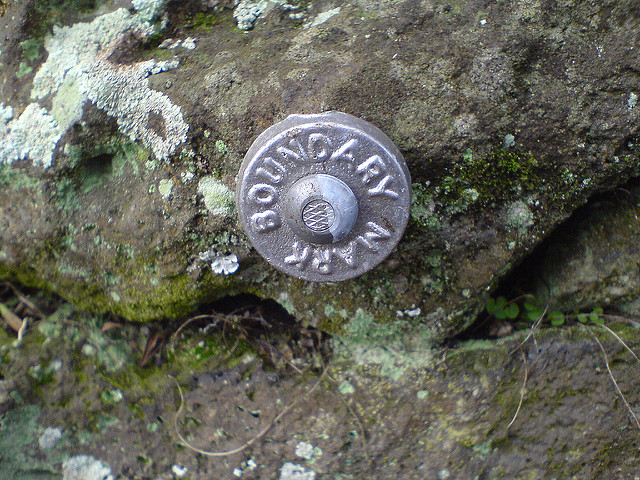
Breaking Through Our Boundaries
We are taught to recognize and respect our own boundaries as well as those of other people. Boundaries are supposedly healthy, and staying within them is a sign of respect.
There are political boundaries and personal boundaries to negotiate. We feel full of potential and possibilities when we cross a new boundary. There are boundaries between seasons in our lives. As we graduate from one focus to another there are boundaries to cross.
Some boundaries are formal while others feel more organic.
Many of us look for, or even build, boundaries in spiritual life. We draw boundaries to separate faith traditions, periods of time, or theological perspectives. Some of us want geographic boundaries to govern our spiritual lives.
Boundaries exist to separate and control. We decide we are distinct, exclusive, and restrict others from crossing our boundary.
People establish boundaries to demonstrate we are in control.
Most of us act as though we believe boundaries exist for good reasons. We accept what we have been told and usually try to stay within our boundaries. Some of us even assume boundaries have been created for our benefit.
A few of us do not even recognize boundaries. They may begin by rejecting artificial boundaries, eventually seeing they are all artificial. Some people ignore boundaries which have been set for them, while others revel in breaking through them.
Sooner or later most of us begin to question our boundaries and break through them.
Are Boundaries Helpful?
We set boundaries for reasons.
Some people think boundaries protect them. They believe boundaries reinforce their strength and independence. There are people who hope boundaries keep life organized, separated, and distinct. Some of us want life, especially spiritual life, to be sorted out and orderly. We may believe strong boundaries keep us from being influenced by people with we disagree.
Other people believe boundaries help hold us inside. They may be concerned about being tempted to stray from the one true path. Some people see themselves walking down a road with boundaries running along both sides. They hope their boundaries will keep them focused on going in the right direction. Boundaries may keep us from getting distracted or losing our way.
These are not the ways boundaries are most helpful to us.
The people who inspire me recognize boundaries are things through which we break. Boundaries motivate us to explore, to discover what is on the other side.
The boundaries which help us are not about keeping us in or other people out. Our boundaries serve as goals, as markers which help us decide where to go next.
We establish boundaries which challenge us to go further, work harder, become more. Our boundaries point us toward the places we will break through them. Boundaries spark our continued journey of exploration and discovery.
How Do We Break Through Our Boundaries?
There are people who approach boundaries like bulldozers or snowplows. They seem to want to build up enough momentum to create a significant hole in the boundary. It is as if they want to make sure anyone who wants can follow them through it.
They may think enough speed can carry them through any further boundaries as well.
Other people appear to approach boundaries by pretending they do not exist. They downplay the effort it takes to break through a boundary. Their attitude is almost as if boundaries do not really exist.
My personal approach to breaking through boundaries is a combination of the two. I want to be ready and prepared with enough power for a breakthrough. At the same time, it can be helpful not to give a boundary too much mental importance.
If it takes two or three attempts to break through a boundary, that is still a breakthrough.
We create our own boundaries and give them the power they have. It is easy for us to see them as more challenging than they are. Working ourselves into a frenzy may not be necessary to break through.
It may be helpful for us to limit or reduce the meaning we invest in each boundary.
We have broken through boundaries before, sometimes without even realizing it. There will be more boundaries to break through in our future.
The key is finding an approach which works best for us with each boundary we face.
My Own Personal Boundaries
Boundaries are personal. Since we create them and give them power, each of our boundaries belongs to us. No other person can break through our boundaries for us, though they can help us.
How we deal with boundaries grows and develops over time.
The strength of the boundaries in my life has always grown from within me. My boundaries have been related to school or work, relationships or spiritual life. Some of the most challenging boundaries to break through, looking back, were the smallest.
One of the boundaries I face right now is the idea of writing a book, or books. I am working on my approach to this boundary, which is a resilient one for me.
It is essential we break through our boundaries each day, each week, each month. We recognize boundaries cannot stop us, but inspire us to break through them.
More powerful than any boundary we face, no matter how high or strong, is our curiosity. We are drawn to explore, to discover what is on the other side of the boundary.
If we break through the next boundary and take one step beyond it, what will we find? What other boundaries will draw us forward?
We may take our time to consider our options and a few worst case scenarios. It might require some effort on our part to sort out the best way to break through a particular boundary.
Ultimately we understand there are no real boundaries in spiritual life. There are only places we have not yet explored.
Questions
Where are our boundaries motivating us to explore today?
How are we breaking through our boundaries this week?
[Image by wonderferret]
Greg Richardson is a spiritual life mentor and leadership coach in Southern California. He is a recovering attorney and university professor, and a lay Oblate with New Camaldoli Hermitage near Big Sur, California. Greg’s website is StrategicMonk.com, and his email address is [email protected].












